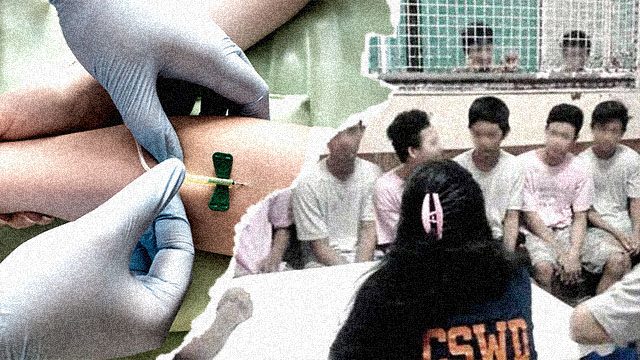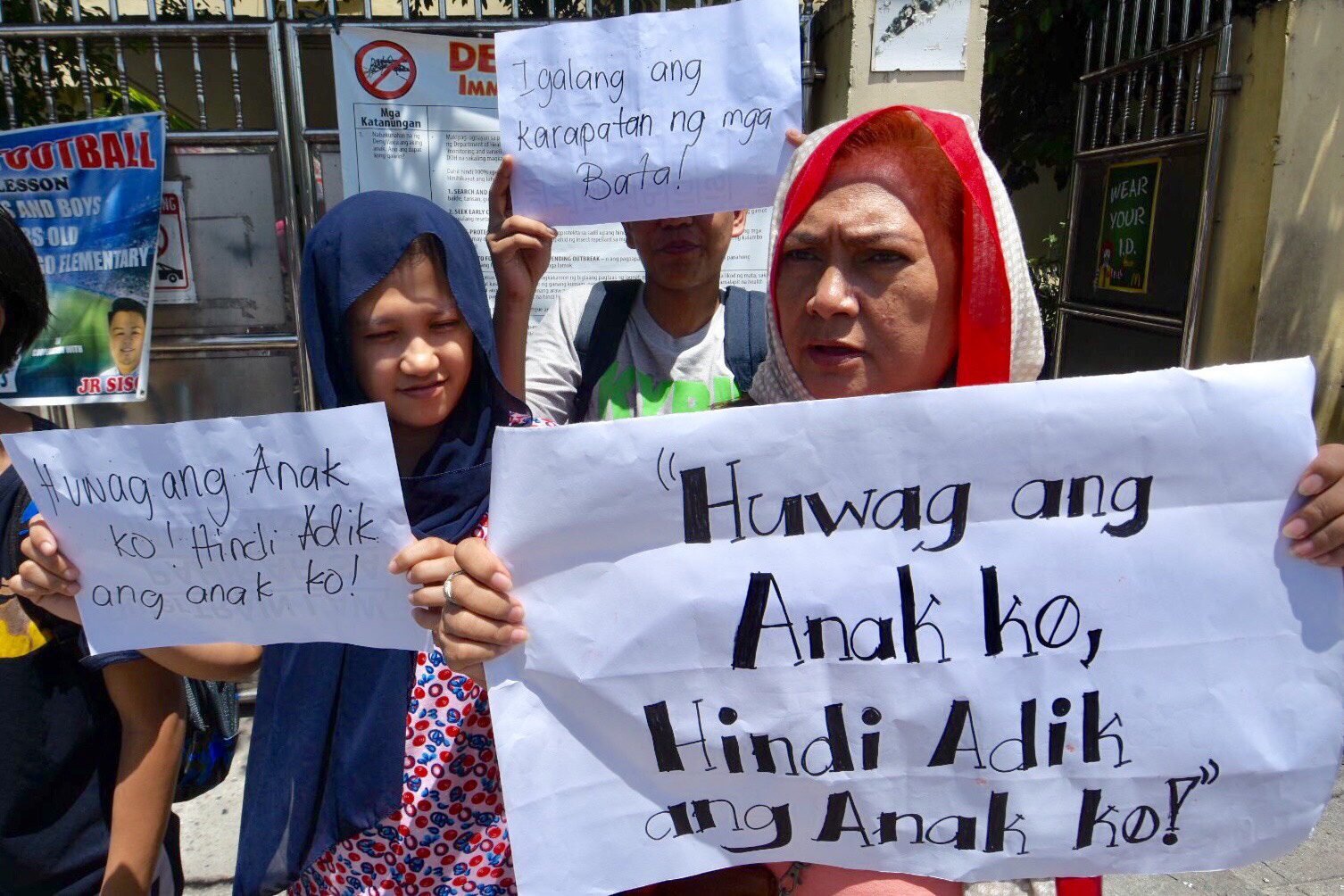SUMMARY
This is AI generated summarization, which may have errors. For context, always refer to the full article.

MANILA, Philippines – In his two years in office, President Rodrigo Duterte and his administration waged war on illegal drugs, targeting Filipino youth in the process, either through killings or policies aimed at them.
Duterte himself has been pushing for the lowering of the minimum age of criminal responsibility from the current 15 years old to 9 years since his 2016 campaign. Amid public uproar, Congress, filled with his allies, has yet to support him by passing a law. (READ: Beyond juvenile delinquency: Why children break the law)
In the House of Representatives, the subcommittee on correctional reforms retained the minimum age of criminal responsibility at 15 years old. In the Senate, Minority Leader Franklin Drilon filed Senate Bill 1603 on October 11, 2017, seeking to lower it to 12 years old. The chamber, however, has yet to hold a legislative hearing.
Faced with such reality, the administration, led by the Philippine Drug Enforcement Agency, found other ways to cover the youth in its drug war. Saying drug use is rampant among the youth, PDEA proposed mandatory drug testing in schools, even including 10-year-old grade-schoolers.
This was met with strong resistance from critics and other government agencies. Human rights organizations slammed the proposal, saying it would only make children vulnerable targets of drug-related killings. (READ: Parents to DepEd: Protect grade-schoolers from proposed drug test)
In Duterte’s first year in office alone, at least 54 Filipino youth aged 18 years and below had been killed in either police operations or vigilante-style killings, according to the Children’s Legal Rights and Development Center in July 2017.
“Imposing mandatory drug testing on schoolchildren when Philippine police are committing rampant summary killings of alleged drug users puts countless children in danger for failing a drug test,” said Phelim Kine, Asia deputy director of Human Rights Watch.
Youth and ‘generations of criminals’
As early as the campaign, Duterte lamented how the Juvenile Justice Law – also known as Pangilinan Law after its author Senator Francis Pangilinan – has allowed children in conflict with the law (CICL) to go scot-free.
He added that the difficulty to prove discernment emboldens CICLs or adults using CICLs to be more aggressive in committing crimes, knowing the children would not be jailed anyway.
The former mayor said that, based on his experience, law enforcers have a hard time dealing with minors because the law allows the police to turn over the suspects to social workers. But social workers and pro-child groups say proper implementation of the law, not amendment, is needed.
In an earlier speech before children, some as young as 4 years old, Duterte once again slammed the law, saying it has resulted in “about 5 [to] 6 generations” of criminals. He said the law allows youth offenders, even those who kill, rape, or steal, to go home to their mothers.
Duterte, however, was misinformed. RA 9433 was already amended in 2013 through RA 10630, which mandates that child offenders, aged 12 to 15 years old, should be detained in youth centers or Bahay Pag-Asa (Houses of Hope) for serious crimes. Local government units are mandated to build such centers. (READ: When ‘Houses of Hope’ fail children in conflict with the law)
Classified as serious crimes are “parricide, murder, infanticide, kidnapping and serious illegal detention where the victim is killed or raped, robbery, with homicide or rape, destructive arson, rape, carnapping where the driver or occupant is killed or raped,” and drug offenses.
Despite the preference expressed by no less than the President, social workers and pro-child groups do not agree. While they admit there are indeed syndicates using children for crimes, they said the adults should be punished, not the children who are mere victims.
“There are instances children are used, but if you compare it to the bulk of CICL, it’s not that significant. Maybe 20%, so we would still go back to the problem. If that’s the problem, it’s not the solution. You’re punishing the child there, not the adults who victimize them,” Mary June Paundog, a social worker in Valenzuela City, said in a mix of English and Filipino.
“Kaya trabaho ng tamad, duwag, o di kaya corrupt na law enforcer ang habulin at parusahan ang mga bata habang pikit ang mga mata at tikom ang mga bibig sa mga sindikatong gumagamit sa mga batang lansangan. Walang lakas-loob ang mga batang hamog na gumawa ng krimen kung wala itong mga backer na mga sindikato. Habulin ang sindikato at hindi ang mga bata,” Senator Pangilinan told Rappler in an email.
(It is the job of the lazy, the coward, or a corrupt law enforcer to run after children while their eyes and mouths are shut when it comes to the syndicates using children for crimes. Street kids won’t have the courage to commit crimes if they have no syndicate backers.)
The United Nations Children’s Emergency Fund (Unicef), citing studies, said “adolescents’ brain function reach maturity only at around 16 years old, affecting their reasoning abilities and impulse control.”
Congress has so far only partially acted on the President’s wish, as the measure is nowhere near becoming a law to this day.
Mandatory drug testing
In August 2017, the Department of Education gave the go-signal for the random drug testing of high school students from both public and private schools. Education Secretary Leonor Briones said this is for prevention and rehabilitation.
Several human rights organizations, parents, and lawmakers condemned the plan. But DepEd argued such order is constitutional, citing Section 36 of Republic Act 9165 or the Comprehensive Dangerous Drugs Act of 2002, which allows random drug testing in secondary and tertiary schools.
Barely a year after the DepEd order, the government has taken it one step further, as it proposed to make drug tests a requirement for all, including grade schoolers.
PDEA moved to expand the mandatory drug tests to include more Filipino youth, as young as Grade 4 students – a move strongly opposed by DepEd.
Parents also condemned the proposal, saying schools would no longer be safe for children.

“Alam namin na kapag nandoon sila sa loob ng paaralan ay safe sila, na walang mangyayari sa kanila…. [Ngayon], parang wala nang kaligtasan ang bawat community, lalo na sa aming mahihirap, dahil ang sa dulo lagi, ang mga biktima naman talaga nito ang mahihirap na katulad namin,” said Vives Moreno, mother of a 10-year-old student and a political officer of Akbayan.
(Parents know that when children are in school, they’re supposed to be safe, nothing bad will happen to them…. Now, it’s like communities will no longer be safe, especially for the poor, because in the end those who become victims are the poor like us.)
PDEA Director General Aaron Aquino earlier said they had found children as young as 10 years old using drugs. But DepEd stood its ground, saying it is already implementing a program on preventive drug education, as approved by Duterte. In the end, Malacañang sided with DepEd while PDEA backtracked.
“The government should provide children with accurate information about the potential risks of drug use, not put them in the crosshairs of a summary killing campaign that has already claimed the lives of more than 12,000 Filipinos,” HRW’s Kline said.
“The government’s repeated dismissal of the deaths of dozens of children in drug war killings by police and unidentified gunmen as ‘collateral damage’ suggests that children’s safety won’t be a top priority,” Kline said.
With such a serious and controversial plan involving the administration’s flagship campaign, it remains a question why there was no coordination between PDEA, DepEd, Malacañang, and other key agencies before publicizing such proposals. (READ: The many times Duterte and his Cabinet contradicted each other)
Congress nod needed
Amid public outrage, PDEA changed its tune and instead proposed mandatory drug tests for high school and college students.
This, however, is against the law. The proposal still needs the backing of Congress, as Section 36 of RA 9165 states that “students of secondary and tertiary schools shall, pursuant to the related rules and regulations as contained in the school’s student handbook and with notice to the parents, undergo a random drug testing.”
There is a bill filed in the House, House Bill 3640, seeking annual mandatory drug tests for students of secondary, tertiary, vocational and technical schools. It remains pending in the committee on dangerous drugs. There is no pending counterpart measure in the Senate.
In the Senate, PDEA has found an ally in Senate President Vicente Sotto III, who previously served as Dangerous Drugs Board chairman.
Sotto supported a mixture of random and mandatory drug testing in schools. But instead of starting it at Grade 4, he said PDEA should “upgrade the testings to Grade 6.”
“People should know mandatory or random drug testing for that matter especially for high school and elementary, Grade 6 or high school and tertiary students, is part of a prevention program. Hindi po ito para manghuli (This is not with an intention to make arrests),” Sotto said in a speech at a PDEA event.
Sotto admitted that a new law is needed to amend RA 9165. But he said mandatory tests could still be done “if [PDEA] believes the school is reportedly notorious for illegal drugs.”
It remains unclear to date if Congress, filled with Duterte allies, would support a measure that would require drug tests in schools.
So far, Congress has yet to approve other Duterte-backed measures, including the death penalty and lowering of age of criminal liability, among others.
Until then and until public support for the drug war stays, government agencies continue to think of more ways to go around the lack of legislation seemingly putting the focus on youth as suspects. – Rappler.com
Add a comment
How does this make you feel?
There are no comments yet. Add your comment to start the conversation.